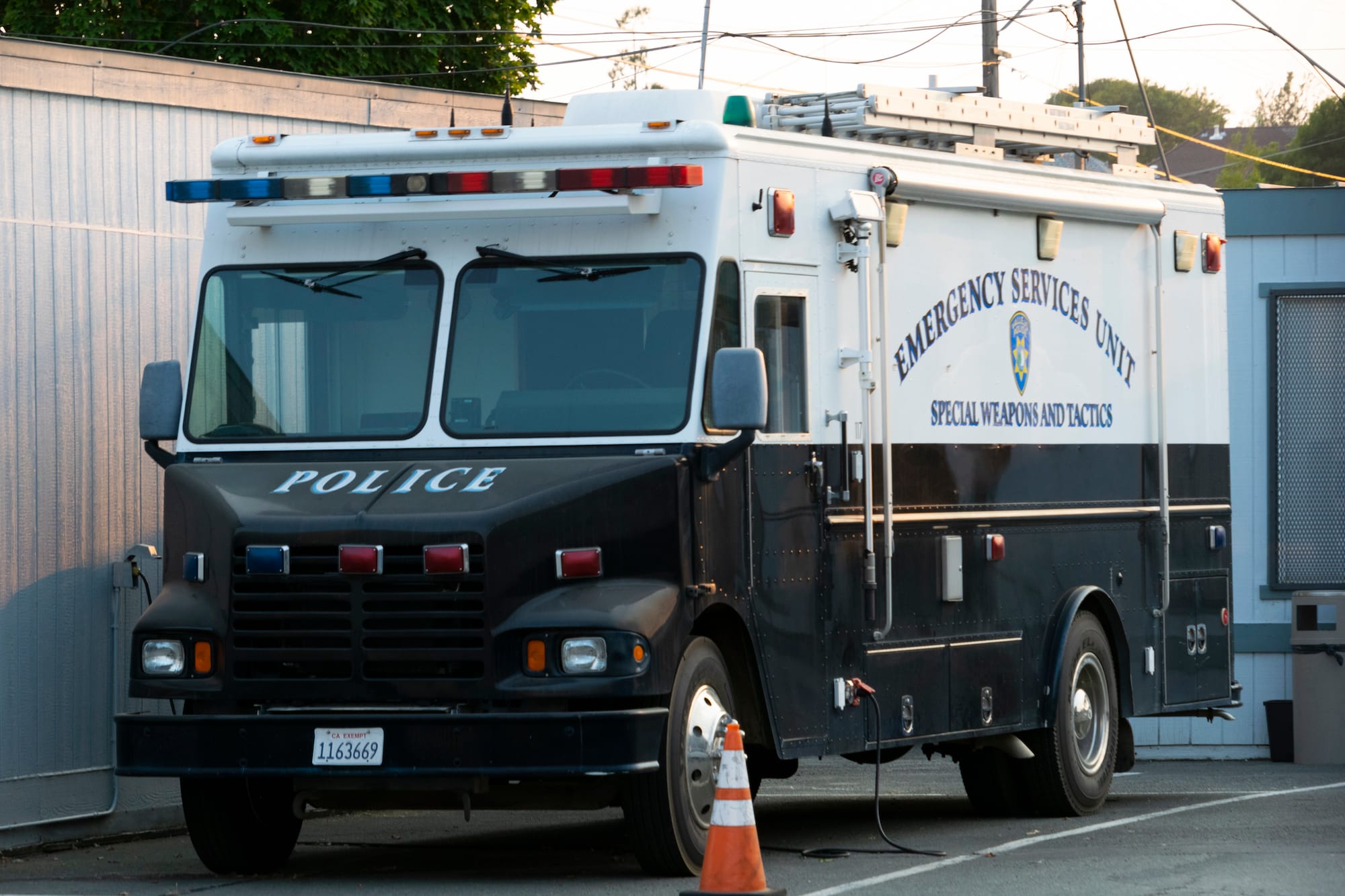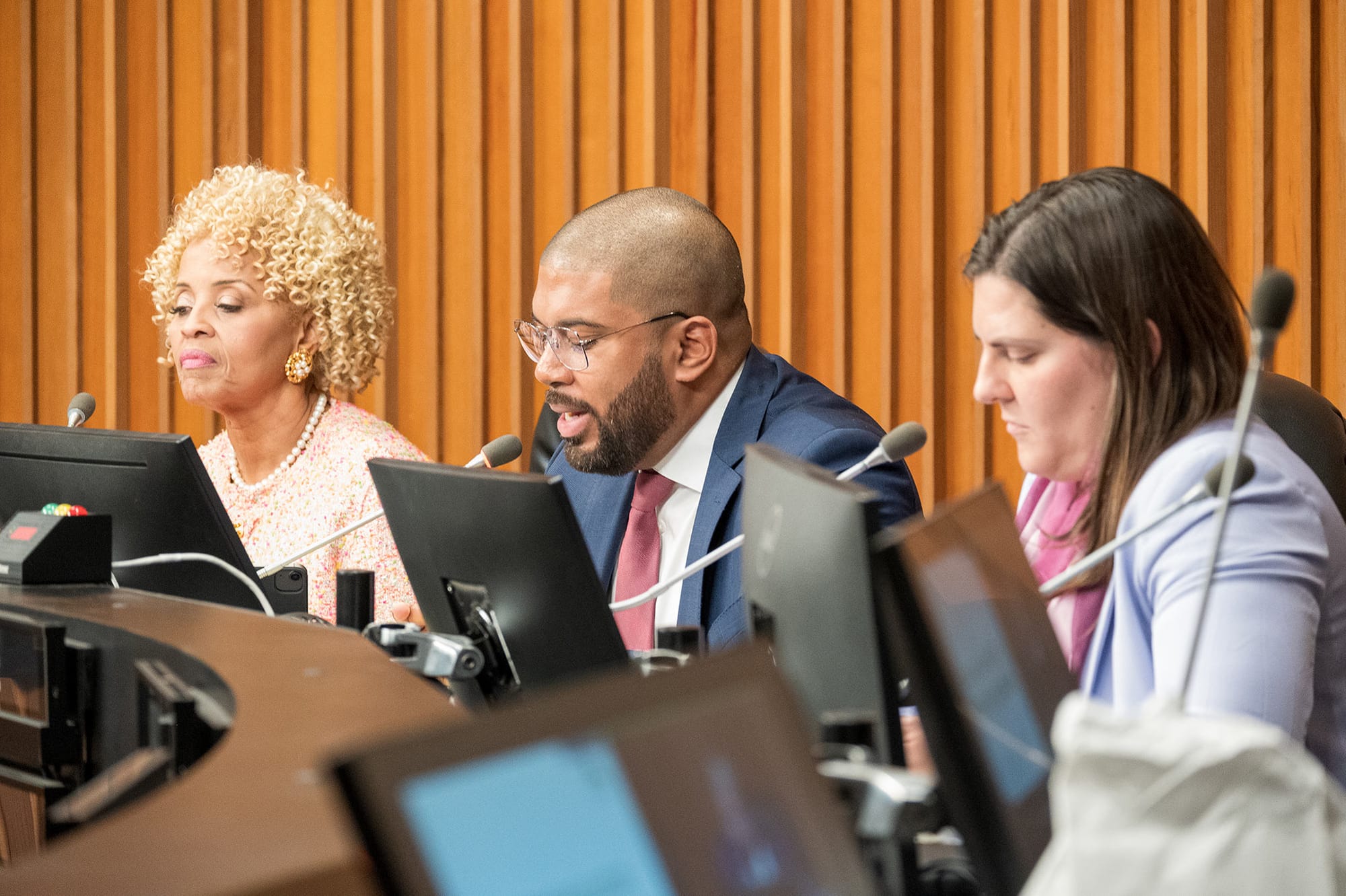VALLEJO – For roughly two years, the Vallejo Police Department has been out of compliance with a state law which requires it to disclose its ownership and usage of military equipment, recently released public records show.
The department took a crucial first step towards compliance earlier this month by publishing its military equipment use policy, which was originally due on May 1, 2022, after inquiries from the Vallejo Sun. Vallejo police must still fulfill several other transparency requirements, however, before being allowed to use military equipment without violating state law.
The law, AB 481, was passed in 2021 in the wake of protests sparked by Minneapolis police Officer Derek Chauvin’s murder of George Floyd. During the protests, law enforcement used military equipment, such as tear gas and non-lethal projectile rounds, at protests across the nation, including in Vallejo, at times causing injuries to protestors and journalists.
The law, which covers every law enforcement agency in California, states that owning and using military equipment “adversely impacts the public’s safety and welfare” and that the public has “a right to know about” and “a right to participate in” the decision to “fund, acquire, or use such equipment.”
In addition to publicly releasing a military equipment use policy, AB 481 requires Vallejo police to post an annual military equipment report for each year it owns or operates military equipment.
The law also gives the public some influence and oversight power on departments’ ownership and usage of military equipment. It requires that departments host an annual community engagement meeting where residents can discuss and ask questions about its military equipment use policy and annual report, and that the department get yearly approval from the City Council for its usage policy and all equipment listed in its report.
The Vallejo Sun first inquired about whether Vallejo police complied with AB 481 in late March. On April 3, Vallejo police spokesperson Sgt. Rashad Hollis told the Sun he would “have to do some research to see if we are in compliance or not.”
Hollis never answered any questions from the Vallejo Sun regarding AB 481, but the department posted a press release on its website on April 5 stating it was sharing its “new AB 481 military equipment use policy with the community for their input.” Vallejo police included their long overdue military equipment use policy in the press release.
The press release said the department intended to start releasing annual reports, hosting community engagement meetings, requiring training for using military equipment, appointing a military equipment coordinator who would ensure AB 481 compliance, and getting City Council approval both for the department’s continued use of their current military equipment and for their proposed policies governing its use — all practices required under AB 481.
In an email, the Vallejo Sun asked Hollis when the community meeting would be hosted, who the military equipment coordinator is, whether officers had already received training for using military equipment, and when Vallejo police planned to ask the City Council for approval. Hollis did not respond.
Although Vallejo police have not fulfilled all the requirements under AB 481 authorizing it to use military equipment, it still uses such equipment. After a SWAT raid in Vallejo’s Glenn Cove neighborhood in February, Hollis told the Vallejo Sun that it’s common for police to break windows using beanbag rounds to make a hole large enough to send smoke grenades or a drone into a building. Beanbag rounds, smoke grenades and drones all qualify as military equipment.
Along with the policy, Vallejo police also released a report which contains an inventory of Vallejo’s military equipment, the cost Vallejo police paid to purchase the equipment, the yearly cost of maintaining the equipment, and guidelines for its authorized use. The report states that the department has spent about $473,000 purchasing military equipment.
According to the report, Vallejo police own 10 different types of drones, and 14 drones total, which cost the department about $45,000. The drones’ listed uses include safety measures like firefighting, emergency rescue and oil and gas inspection as well as broad categories labeled “law enforcement” and “police affairs.” Additionally, the department owns two remote operated ground robots, which cost $154,000 in total. Their listed uses include bomb disposal, handling hazardous materials, and surveillance.
The report lists four different types of specialized rifles, 34 of these weapons in total, which cost about $60,000. Vallejo police said the specialized rifles are authorized to be used in “large critical incidents, active shooter, or incidents where an armed suspect is threatening the public or officers and where there may be a need to defeat body armor.”
In 2020, Detective Jarrett Tonn used one of these weapons, a Colt M4 Commando, to fire five shots at 22-year-old Sean Monterrosa, striking him once and killing him. An investigation found that Tonn violated department policy in the shooting, and he was terminated but later won his job back in arbitration. Monterrosa was unarmed and had a roofing hammer in his pocket which officers said they thought was a gun.
The department's inventory also includes three different weapons that fire non-lethal ammunition, 14 different types of non-lethal ammunition, six different types of tear gas canisters or grenades, and flash-bang ammunition intended to stun and distract. Vallejo police said it spent about $92,000 purchasing this equipment, and a small portion was donated from the Solano County Office of Emergency Services.
According to its report, most of the money Vallejo police spent on military equipment went towards vehicles. In total, the department has spent $276,000 purchasing two armored vehicles, two vans and a motorhome used as command, control and emergency transport vehicles. The department also has one additional armored vehicle donated from the Solano OES.

The equipment use policy says the armored vehicles are authorized for use when mobile physical cover is needed in active scenes involving actual or threatened violence, vehicle blocking, and medical emergencies and disaster response. The vans and mobile home are authorized for use in “critical incidents, large demonstrations, or prolonged incidents where an on-scene command post and hostage negotiation team would help with the outcome of the incident.”
The report did not contain a list of any equipment Vallejo police seeks to acquire or borrow in the next year, which AB 481 requires if departments intend to use any new equipment not currently on their inventory list.
John Lindsay-Poland, co-director of the California Healing Justice Program of the American Friends Service Committee, advocated for AB 481’s passage and has been monitoring whether or not departments are complying with it. He thinks “the structure and rationale of the law is really good,” because it stops the policies governing the ownership and usage of military equipment from being “solely in the hands of departments themselves.”
“Law enforcement has had an enormous amount of discretion in its usage of this equipment,” Lindsay-Poland said. “The purpose of AB 481 is to address militarization in the state by making it more transparent, and to place usage policy in the hands of civilian elected officials.”
But Lindsay-Poland said that the law also has “significant limitations.” Outside of taking the matter to court, he said that citizens who are not elected officials have “no real way to address violations” if departments don’t follow AB 481.
The Vallejo Sun asked Attorney General Rob Bonta’s office if it had done anything to inform, warn, or penalize Vallejo police for not complying with AB 481. The Sun received an emailed response which said “we’re unable to comment on, even to confirm or deny, a potential or ongoing investigation.”
Vallejo police have been under the Department of Justice’s oversight since 2020. On April 9, the Justice Department and Vallejo police reached a new settlement requiring reforms, but it doesn’t mention military equipment.
Vallejo police also included a section in its policy which allows the department to obtain or borrow new equipment temporarily “in exigent circumstances” without City Council approval, if the chief of police or a designee authorizes it. The department must notify the council within 30 days of obtaining or using the equipment and include the equipment in the department’s next annual report. The policy does not define what constitutes exigent circumstances.
Lindsay-Poland is critical of this section, calling it “a big loophole for compliance with the state law.”
“In my view the Vallejo City Council and community members should require that it be changed to conform with state law,” he said, “because the state law has no provision for acquiring military equipment in exigent circumstances.”
Mayor Robert McConnell told the Vallejo Sun in an email on April 8 that he had not received any policies or reports from Vallejo police regarding AB 481. He also said he was “not against the simple fact of an ownership of [military] equipment,” but thinks that since “there is a serious concern that the transparency requirement has apparently not been complied with” he feels “the report should be provided to the police surveillance advisory board for review and recommendations.”
The Vallejo Sun emailed all Vallejo city councilmembers multiple times to ask them about their views on the Vallejo police equipment use policy and its noncompliance with AB 481, but none of them responded.
Before you go...
It’s expensive to produce the kind of high-quality journalism we do at the Vallejo Sun. And we rely on reader support so we can keep publishing.
If you enjoy our regular beat reporting, in-depth investigations, and deep-dive podcast episodes, chip in so we can keep doing this work and bringing you the journalism you rely on.
Click here to become a sustaining member of our newsroom.
THE VALLEJO SUN NEWSLETTER
Investigative reporting, regular updates, events and more
- policing
- Vallejo
- Vallejo Police Department
- AB 481
- George Floyd
- Rashad Hollis
- Jarrett Tonn
- Sean Monterrosa
- Solano County Office of Emergency Services
- California DOJ
- Rob Bonta
- John Lindsay-Poland
- American Friends Service Committee
- Robert McConnell

Zack Haber
Zack Haber is an Oakland journalist and poet who covers labor, housing, schools, arts and more. They have written for the Oakland Post, Oaklandside and the Appeal.
follow me :




